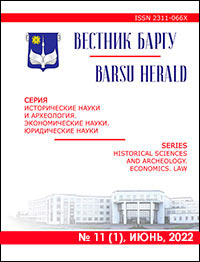NEW DIRECTIONS IN THE IDEOLOGY OF THE COMMUNIST PARTY OF CHINADURING THE PERIOD OF THE REFORM AND OPENING-UP POLICY
Keywords:
China; modern ideology of the CPC; theory of socialism with Chinese specificity; moderately prosperous society (xiaokang shehui); 19th Congress of CPCAbstract
The following paper studies the new trends in the ideology of the Communist Party of China (CPC) after Deng Xiaoping proclaimed the policy of reform and opening-up. During this period, the CPC managed to combine the general
principles of Marxism with the specific tasks facing the country. The China-specific theory of socialism takes into account the socio-economic, political, ideological, and cultural characteristics of Chine. In this regard, the building of the “xiaokang shehui” society (moderately prosperous society) is the core of the PRC’s politics, which influences the choice of economic reforms strategy.
Ref.: 10 titles.
Downloads
Published
Issue
Section
License
Copyright (c) 2023 Вестник БарГУ Серия "Исторические науки и археология. Экономические науки. Юридические науки"
Это произведение доступно по лицензии Creative Commons «Attribution-NonCommercial» («Атрибуция — Некоммерческое использование») 4.0 Всемирная.
Авторы сохраняют за собой право заключать определенные договорные соглашения, касающиеся неисключительного распространения опубликованной версии работы (например, размещать ее в институциональном репозитории, публикация в книге) со ссылкой на ее первоначальную публикацию в этом журнале.





